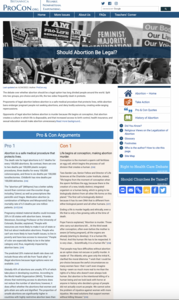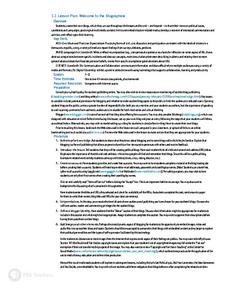Constitutional Rights Foundation
History of Immigration From the 1850s to the Present
The Statue of Liberty may embrace the huddled masses of the world, but has American society always joined in? After young historians read a passage about the history of American immigration in the 19th and 20th centuries, focusing on...
Personal Genetics Education Project
Direct-to-consumer Genetic Testing
If you knew that you were likely to develop Alzheimer's disease in your future, how would it affect your life in the meantime? This and other similar thought-provoking questions are discussed in a lesson plan about the availability of...
K12 Reader
Biography of Abraham Lincoln
One skill essential to reading comprehension, is learning how to summarize a text. After reading a biography of Abraham Lincoln, readers demonstrate this ability by crafting a brief summary of Lincoln's life.
Curated OER
School Uniforms: Debating the Issue and Creating an Advertisement
Fifth graders debate the issue of school uniforms. They research, finding supporting evidence supporting their stance. Using the Lincoln-Douglas form of debate, 5th graders discuss the positive and negative issues of the topic. They...
National Library of Medicine
Your Environment, Your Health: The Great Debate—Bottled Water vs. Tap Water in Our School
Should bottled water be sold in schools, or should they only provide tap water? The summative unit in the six-part series encourages scholars debating this topic. The lessons teach how to build an argument, how to gain background...
The New York Times
Collateral Damage? Researching a Connection Between Video Games and Violence
Hook your class into an exploration of and discussion about violence in video games with a cute animal clip and a video game trailer. After a quick discussion about how media can affect mood, class members read a related article and...
Curated OER
Abortion
Abortion has remained a highly controversial issue ever since the landmark 1973 Roe v. Wade decision. Using the website, learners sift through all the information they need to participate in a debate about the topic. They learn about the...
Advocates for Human Rights
The Right to a Clean Environment in the United States
Even if a school has gone digital, chances are there's still plenty of paper being used. The three activities help scholars learn about the environmental impact of paper and another consumer products of their choosing, the issue of...
Curated OER
Welcome to the Blogosphere
Create a blog spot for your classroom and promote online discussions. There are several blogging websites listed here, and you can create one specific to each class or one collective site. Teach your learners how to post on the blog, and...
Curated OER
The Great Debate
Groups of learners investigate the persuasive genre of writing as they research and present on an issue. They research the Internet (possible websites are included) for a topic and locate information to present to the opposing team. In...
Teach Engineering
Manned Mission to Mars
To go or to not to go — the question for a mission to Mars. This resource provides details for a possible manned mission to Mars. Details include a launch schedule, what life would be like on the surface, and how the astronauts would...
DocsTeach
How Have Americans Responded to Immigration?
While America says it welcomes from other countries the tired and poor yearning to be free, the record is mixed on whether there has been a warm reception for immigrants. Class members use an interactive graphic scale and primary source...
Curated OER
Our Classroom Constitution
Develop a system of classroom rules created by the kids, for the kids with this three-part lesson series on the US Constitution. After learning about the structure of the Constitution and the government it established, young scholars...
National First Ladies' Library
How a Bill Becomes a Law
High schoolers engage in the democratic process and to learn how a bill become a law. Then they write a bill they would like as law in their classroom. Students also form committees that will review the list of bills to determine if they...
Cornell University
Fibers, Dyes, and the Environment
Nanofibers can be made through electrospinning or force spinning in order to reduce the negative impact on the environment. Pupils study the role of fibers and dye on the environment through a series of five hands-on activities. Then,...
WindWise Education
How Do You Feel About Wind Energy?
Tell me what you really think. The class reviews articles related to wind energy to see how the author uses words, phrases, and images to sway the reader. Through a class discussion, individuals share their feelings from the media...
Carolina K-12
How Do I Pre-Register and Vote in North Carolina?
This practical activity helps young citizens learn about pre-registration to vote in elections, discuss the merits and flaws of the pre-registration process, and register themselves. The concluding activity has young voters creating an...
Cold Spring Harbor Laboratory
DNA Responds to Signals from Outside the Cell
How do cells know when to replicate, transcribe, and stop? James E. Darnell, Jr. shifted from studying medicine to biochemistry and decided to address this mystery. Learn about his research, discoveries, and the impact on future medical...
Minnesota Literacy Council
Introduction to Historical Thinking
Christopher Columbus: hero or villain? Prepare class members for the debate with activities that asks them to think critically about how history is reported.
Curated OER
Forensic Colloquium Experience: Debating the Issues
Pupils prepare for an participate in a debate. They watch instructional videos on how debates proceed. Pupils work in teams to research various topics, present their opinions on the issue, and respond to opposing viewpoints during a...
Curated OER
How To Argue Without Cheating
In this debate activity, students read and learn about the fine points of debate and persuasion. The vocabulary presented and the ideas are quite advanced; premise, conclusion, syllogism, ad homineum, and other difficult terms.
American Institute of Physics
Historical Detective: Edward Alexander Bouchet and the Washington-Du Bois Debate over African-American Education
Young scientists meet Edward Alexander Bouchet who, in 1876, was the first African American to receive a PhD in Physics. This two-part lesson first looks at the debate between Booker T. Washington and W.E.B. Du Bois about the type of...
Children’s Hospital of Philadelphia
Vaccine Safety
Enter the debate on vaccines. Small groups research topics related to vaccine safety in the last lesson plan in a unit of five. In the process of the research, team members learn how to determine the validity and credibility of a...
K20 LEARN
Criminal Motivations: Irony and Characterization In "The Cask Of Amontillado"
Edgar Allan Poe's short story "The Cask of Amontillado" is a bit of a puzzle. Critics have long debated Montresor's motives for killing Fortunato. Young scholars examine examples of the three types of irony (verbal, dramatic, and...

























